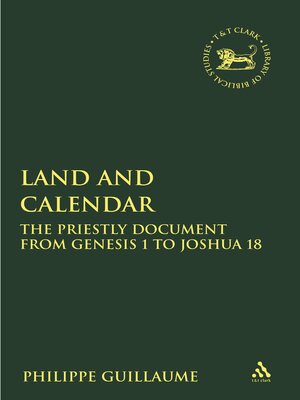Land and Calendar
ebook ∣ The Priestly Document from Genesis 1 to Joshua 18 · The Library of Hebrew Bible/Old Testament Studies
By Philippe Guillaume

Sign up to save your library
With an OverDrive account, you can save your favorite libraries for at-a-glance information about availability. Find out more about OverDrive accounts.
Find this title in Libby, the library reading app by OverDrive.



Search for a digital library with this title
Title found at these libraries:
| Library Name | Distance |
|---|---|
| Loading... |
Thanks to very peculiar style and theology, Pg was identified as far back as 1869 by Theodor Nöldeke and remains one of the last pillars of Pentateuch research after the fall of the Wellhausen model. Its existence is rarely doubted, but its extent is debated. Does it end already in Exodus (Otto, Pola, Bauks) or does it go as far as Deuteronomy (Noth, Frevel) or even into Joshua (Lohfink, Knauf)? The end determines Pg's notion of the land and its conquest, important subjects
today for the formation of the Pentateuch (was there first a Hexateuch?).
The 364-day perpetual calendar offers a reliable criterion to identify Pg within the final text of the Hexateuch because the simple mathematic of the calendar are easier to control than hypothetical redactors. Pg is divided into seven periods, from creation to the entry of the sons of Israel in an empty land of Canaan. The festival calendar of Leviticus 23, and the Jubilee of Lev 25 constitute the heart of Pg, the practical outworking of principles presented in the narrative. Bloodless atonement with no connection to any temple whatsoever, peaceful entry into the empty Promised Land, eternal sabbatical rhythm, are Pg's major theological characteristics.
today for the formation of the Pentateuch (was there first a Hexateuch?).
The 364-day perpetual calendar offers a reliable criterion to identify Pg within the final text of the Hexateuch because the simple mathematic of the calendar are easier to control than hypothetical redactors. Pg is divided into seven periods, from creation to the entry of the sons of Israel in an empty land of Canaan. The festival calendar of Leviticus 23, and the Jubilee of Lev 25 constitute the heart of Pg, the practical outworking of principles presented in the narrative. Bloodless atonement with no connection to any temple whatsoever, peaceful entry into the empty Promised Land, eternal sabbatical rhythm, are Pg's major theological characteristics.







